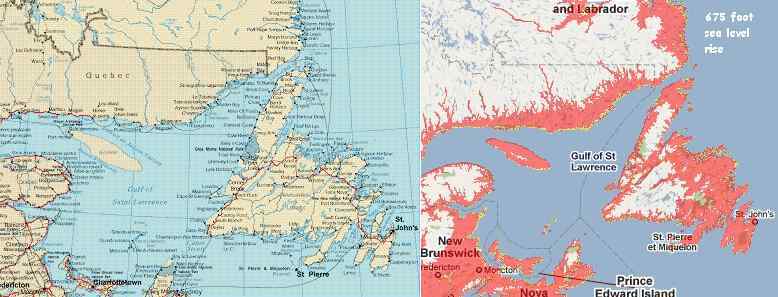
| |
 |
![]()
Newfoundland residents today face the cold Atlantic with many inlets along the rocky shore, with ocean fishing and travel by boat being a familiar activity. Being hardy folk, used to relying on themselves and each other without assistance from the outside world, they have the mindset that survivors of the shift will need. Newfoundland will find itself, thus, well positioned to take advantage of the situation they find themselves in, after the shift, in that boat travel will be the best means of transportation as the existing poles melt and settlements at lower elevation disappear under water, and ocean fishing will prove to be one source of food available during the couple decades of gloom affecting agriculture after the shift. Those survivors wishing to assist others, less fortunate, should consider going afloat along the coastline to what was formerly inland, to team their skills to other survivors.
ZetaTalk ™
Newfoundland, as with Quebec and Nova Scotia, will have much of its landmass above the waves after the pole shift and the 675 foot rise in sea level expected
within two years after the pole shift. Being hardy folk, with sea faring skills, the survivors will also do well, feeding themselves from the sea as well as gardening in a
climate that will be much warmer than at present. The splitting of the Seaway during the pole shift will result in Newfoundland gaining an extra 50 feet in elevation,
as the region will bounce up when the Seaway rips. Housed on the same rock strata and Nova Scotia, Newfoundland will find it is further from Quebec, after the
split, as the Seaway will broaden along the rock strata boundaries that runs along the Seaway and thence north of Newfoundland.
As with the New England states, and eastern Canada in general, Newfoundland will find its greatest burden after the pole shift to be migrants from the crowded
East Coast of the US. Boatloads of these noisy and demanding migrants will arrive and refuse to be turned away. A firm immigration policy should be established,
with houseboat living presented as the alternative. Container gardening can be done on a houseboat, and fishing and housekeeping also. Force these immigrants to
do their own work, and refuse to be turned into a servant class. Houseboats can migrate along the new coastline, through what is now northern Canada (which will
become flooded lands) and thence to Alaska, a very tropical target. Expelling the selfish, on their houseboats, is thus not cruel, but merely a means of forcing them
to take care of themselves.
ZetaTalk ™ March 19, 2011

See also the ZetaTalk Video on Newfoundland
Note East Coast Migration commentary.